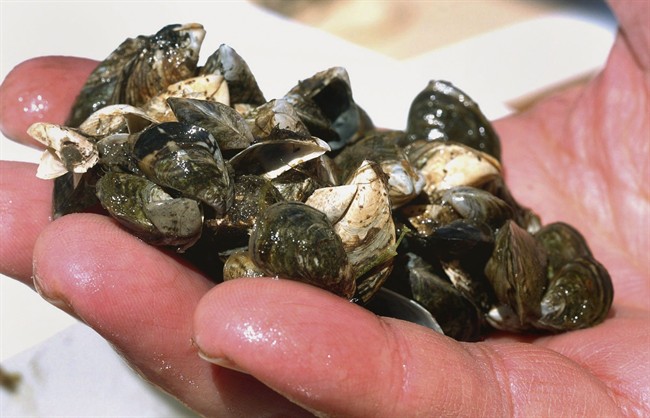OTTAWA – Tough new American rules on ballast water discharge in the Great Lakes, designed to curb the spread of aquatic hitchhikers like zebra mussels and goby fish, will penalize Canadian freighters while all but ignoring U.S. vessels, say shippers north of the border.

The powerful U.S. Environmental Protection Agency will begin implementing the new ballast rules in December after years of wrangling among Canadian officials, the U.S. Coast Guard, the state of New York and other Great Lakes jurisdictions.
Read more: A look at invasive species in the Great Lakes
Earlier this year, the EPA essentially put the brakes to New York efforts to implement tough standards that were significantly more stringent than international regulations. Those proposed rules prompted fears that Great Lakes shipping would have screeched to a halt, since all foreign ships must pass through New York waters on their way to the lakes.
The new rules require overseas vessels to install ballast-cleaning technology before dumping their waste water into the Great Lakes. That costly retrofitting will affect as much as 50 per cent of the Canadian Great Lakes fleet.
Read more: Scientists find plastic in all of Great Lakes
Gary Doer, Canada’s U.S. ambassador, said the regulations amount to a solution that won’t unduly punish the lakes’ $11-billion shipping industry.
- Invasive strep: ‘Don’t wait’ to seek care, N.S. woman warns on long road to recovery
- Ontario First Nation declares state of emergency amid skyrocketing benzene levels
- Do Canadians have an appetite for electric vehicles? Experts are divided
- Nearly 200 fossil fuel, chemical lobbyists to join plastic treaty talks in Ottawa
“We think that it’s gone from a potentially devastating situation for the Great Lakes in terms of economics to a very manageable situation that does improve the regulations for ballast water that are intended to deal with invasive species, and protects the economic livelihood of both sides of the border,” Doer said in a recent interview.
“There’s no question at the end of the day we’ve got protection of our shipping industry on both sides of the border, but we’ve also got improved standards.”
But Greg Wight, head of shipping company Algoma Central Corp., said the EPA rules essentially exempt the entire U.S. Great Lakes fleet while forcing Canadian ships to comply if they hope to sail in American waters, placing Canada at a significant competitive disadvantage.
Ships that don’t venture east of Anticosti Island, at the mouth of the St. Lawrence River, are exempt from the new regulations, Wight noted.
U.S. vessels are predominant in the upper Great Lakes; they’re too big to proceed past the Welland Canal. Most Canadian vessels, meantime, sail up Canada’s east coast and into Arctic waters.
Ships built before 2009 are also exempt from the new rules. The U.S. has no new Great Lakes ships and no plans to build any; Canada has 16 post-2009 vessels.
“So: same type of vessel, same trade, but being treated differently because of when they were built,” Wight said.
“There’s no logic to it, but it’s certainly convenient that the U.S. fleet is totally covered and we’re not.”
Wight places part of the blame with Transport Canada, which has yet to unveil its own ballast discharge rules that could level the playing field between the two countries. Transport Canada couldn’t immediately say on Thursday when it would announce its ballast discharge regulations, but they’re expected some time next year.
“Part of the problem is that our Canadian government is not reacting to this, and that’s a concern,” Wight said Thursday in an interview from St. Catharines, Ont.
Read more: Invasive species
“The Canadian government has to act and has to look at this and come up with rules that treat everyone fairly. They should develop their own regulations and go to the U.S. and say: ‘You accept ours, and we’ll accept yours.”‘
The growing preponderance in the Great Lakes of creatures like zebra and quagga mussels, round gobys and spiny water fleas has prompted U.S. environmental groups to go to court to protect the waters from other invasive species.
In July, the National Wildlife Federation joined other environmental organizations in a lawsuit that accuses the EPA of failing to protect the Great Lakes from invasive species with its new rules.
“We don’t think they’re nearly sufficient enough to protect the Great Lakes,” the Wildlife Federation’s Marc Smith said in an interview this week.
“It’s certainly a step in the right direction, but we’re looking for the court to send this back to the drawing board and for the EPA to come up with new, tougher standards.”
Environmentalists want to see new regulatory standards that give industry enough time to figure out how to meet those rules, Smith said.
“We just can’t say: ‘No, there’s no technology, so don’t put put any regulations down.’ That’s not a solution. Even shippers know that ballast water is a problem. The questions is, how do we stop it?”
Contaminated ballast water has indeed been fingered as the culprit for as many as 186 invasive species, including the round goby and its insatiable appetite for the eggs of fish native to the Great Lakes, like lake trout.
Such aquatic invaders cause an estimated $200 million in damage on the Great Lakes annually. Zebra mussels, in particular, require hundreds of lakeside municipalities to pry them from water intake pipes.
The wildlife federation’s Smith says industry routinely complains about costs but eventually meets tougher standards when required, pointing to the auto industry and emissions standards as one notable example.
“There are million-dollar industries that rely on the Great Lakes, including tourism and fisheries,” he said.
“What we’re trying to do is prevent anything new from coming in. All it takes is one species and the right conditions in the lake for it to become a serious problem. We simply don’t want the next zebra mussel to come in.”

Comments